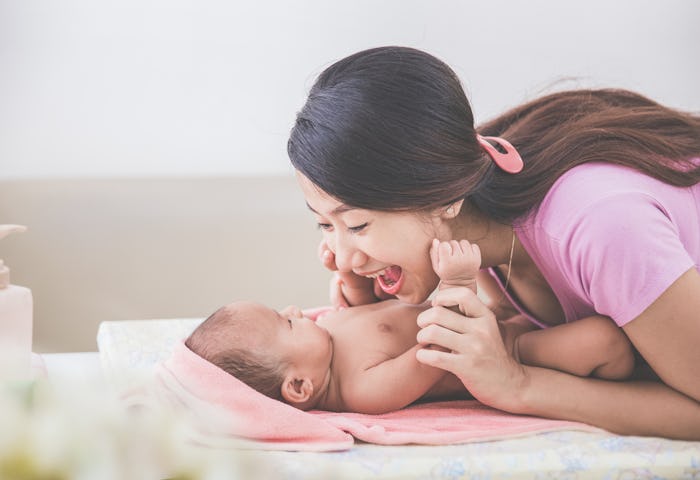Life
Study Finds Baby Talk Is Actually Really Important For Your Kid, So Coochy Coo Away
Contrary to what the Dragonfly Inn's not-so-friendly concierge Michel Gerard would have you believe, baby talk is actually really important for a child's development and is nothing to be embarrassed about. Researchers have determined that the practice of baby talk helps babies learn to speak, perhaps better than they would learn from unmodified speech. Beyond just mirrored practice, according to the study, the variances in baby talk help infants recognize specific voices and to determine that their mothers are speaking to them rather than another adult.
While the stream of sounds directed at an infant may not resemble any complex speech patterns that you are used to hearing, the subtle changes made to the voice during baby talk have proven it to be more multifaceted than initially realized. Researchers from the recent study conducted by Princeton University monitored mother-child interactions to gain more insight into the technicalities of baby talk.
According to The Guardian, researchers studied 24 mothers while they communicated with their children, all of whom were between 7 months old and 1 year of age. These mothers talked to their children in 10 different native tongues — examples include English, Spanish, Mandarin, and Hebrew. They were encouraged to play and communicate just as they would at home.
Along with recording these interactions, researchers also recorded interviews with the mothers to retain examples of their speech when talking to other adults. Researchers then analyzed short clips of both types of recordings with a computer system that extracted a measure of the timbre in moms' voices without other factors, such as rhythm and variations in pitch. These timbres have since been referred to as "vocal fingerprints," as the BBC explained, that can be used to "teach" an algorithm-based machine-learning system to tell the difference between speech that is meant for babies and that meant for adults.
The results of this study, published in the scientific journal Current Biology, showed that the computer system was able to distinguish between the different mothers based on their vocal fingerprints. Additionally, the system was also able to determine whether the clips came from baby talk or normal speech roughly 70 percent of the time, according to The Guardian.
While this study only involved mothers, researchers believe that the pattern would be found in other family members and caregivers as well. Dr. Elise Piazza, co-author of the research from the baby lab at Princeton University, told Newsweek as much:
Adults are generally motivated to engage infants, and they intuitively know that babies respond well to the exaggerated patterns in baby talk. Infant-directed speech is just one example of tailoring your communication style to a particular audience, which we do all the time.
Prior to this study, researchers were aware that children learn more from communication directed specifically at them. Piazza explained to the BBC how this new information fits into existing knowledge on the topic:
There is wide-ranging research showing infants learn better from infant-directed versus adult-directed speech. Specifically they can segment words into syllables better and they can learn novel words better and that probably encompasses these timbre features.
Along with providing insight into how babies recognize voices, Piazza told The Guardian that the results of this study could also be beneficial to the development of children's educational tools. She explained to the publication:
For instance maybe using a realistic timbre of [baby talk] when designing some kind of virtual [voice] that is geared towards enhancing communication skills or maybe even teaching a child a second language.
So, the moral of this study is that the next time someone gets on you for your cutesy baby talk voice, just tell them that you are paving the way for future generations to learn a new language. But really — baby talk on, parents. Your children are benefiting from it.
Watch Romper's new video series, Romper's Doula Diaries:
Check out the entire Romper's Doula Diaries series and other videos on Facebook and the Bustle app across Apple TV, Roku, and Amazon Fire TV.
